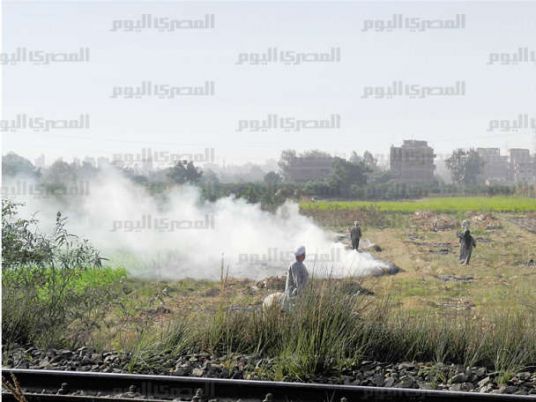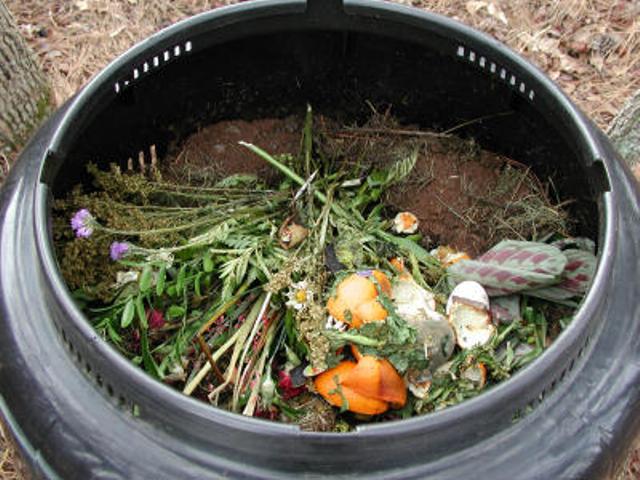
On the Cairo-Alexandria Delta Road smoke rises from the fields, forming a gray cloud. Large piles of rice straw wait on the ground to be minced or incinerated. Machines whir with a metallic sound as they slice the straw for the farmers to store it in sacks.
Over the years, as agricultural production has increased, farmers have found themselves with more and more rice straw left over from their crops and began to burn the straw in larger quanitities to quickly dispose of it and return the nutrients back into the soil.
Agricultural burning is now one of the largest contributers to air pollution in Cairo, leading to an increase of cancer-causing agents in the air. Despite governmental laws to curb the burning of rice straw, the problem still persists.
While pedestrians walked fast to avoid inhaling the dust from the sandstorm, 13-year-old Ahmed stood under the scorching sun facing the storm. The handkerchief that covered his face did not help much. His eyes were red.
With straw scattered on his body, he bends down to pick up large piles of rice straw and put them in a primitive mincing machine. He tries to pull himself together so that he can finish his demanding job.
At 8 am, 50-year-old Hamada Awny, a farmer from the village of Zankalon in Sharqiya, sits in the shade leaning his back against a tree and following up the process. He instructs young farmers to lay the rice straw evenly on the ground in order to burn it in the evening.
“Farmers who have rice straw are like drug dealers,” he says. “Both are afraid the police will come and take their stuff away.”
Awny rents an acre and cultivates it with rice. “If I burn the straw at harvest, the Ministry of Environment fines me LE10,000. And if I mince it for animal feed, I have to pay LE50 a day per helping hand and LE80 per hour for the mincing machine,” he says.
The Ministry of Environment calls on farmers not to burn the rice straw in order to avoid the fine.
Abdallah Raafat planted four acres of rice and collected five tons of straw. “No ministry official came to tell me what to do with the straw,” he says. “Dreading the fine, I had to mince it and it cost me LE4,000.”
Ahmed Hanafi from the village of Al-Qaraqra suggests that farmers dry the land if the government fails to solve that problem. “Farmers are dying slowly. Prices of diesel and fertilizers are high and there is no water for irrigation,” he says. “The government buys the straw for peanuts and resells it to us in the form of expensive animal feed.”
“It would be better if the Ministry of Environment provided farmers with free pressing machines for them to turn the straw into fertilizer,” he says. “We would thereby eliminate the black cloud on the one hand and support the farmers on the other.”
This problem drove farmers to build primitive factories to recycle the rice straw, but it did not last long. One such factory in the village of Bahtit in Sharqiya was turned into a an animal feed store.
Ahmed Abdel Raouf, a farmer, says the Ministry of Environment closed down those factories under the pretext that they pollute the air.
Behind a sign that you can hardly read, and over an area of two acres in the village of Kafr al-Azazi, stands a factory to convert rice straw into methane. Work started at that factory in 2006 but was stopped four years later.
One of the workers said the Ministry of Environment bought two such factories from China but they were closed four years later because the machines kept breaking down and there were no spare parts, nor were there minimum safety measures against fire, which put the lives of the workers at risk.
Two years ago, there was a protocol between the Ministry of Environment and the Egyptian Company for Recycling Agricultural and Solid Waste to collect the rice straw. Yet because the company owed the Finance Ministry a lot of money, the protocol was canceled.
Burning straw is not a random procedure at any time of the day. A farmer knows when it should be done.
Ahmed Rabie explains; “Before burning, the straw is laid evenly on the ground because it does not burn easily in piles and it would produce fumes that could stay for three days. Also, it is burned from 10 am until 4 pm or at 10 pm, otherwise the dew drops make it difficult for it to burn.”
Mohamed Abdel Hady, a farmer from Kafr al-Azazi, sleeps next to the straw piles on the highway with a fire extinguisher that he bought for LE500. “If the piles burn, I go to jail,” he says. “This thing is a nightmare to me.”
Edited translation from Al-Masry Al-Youm




